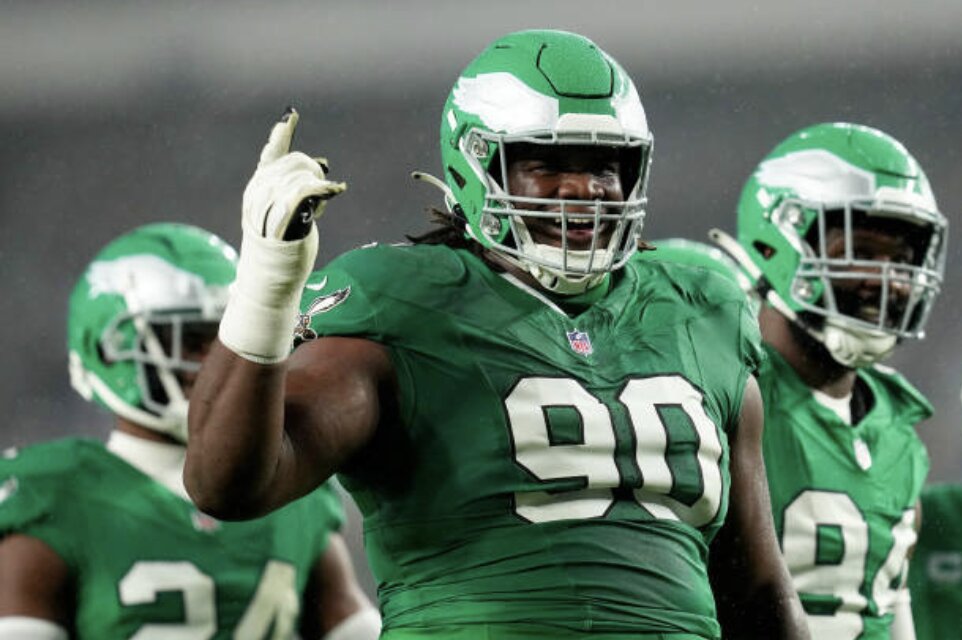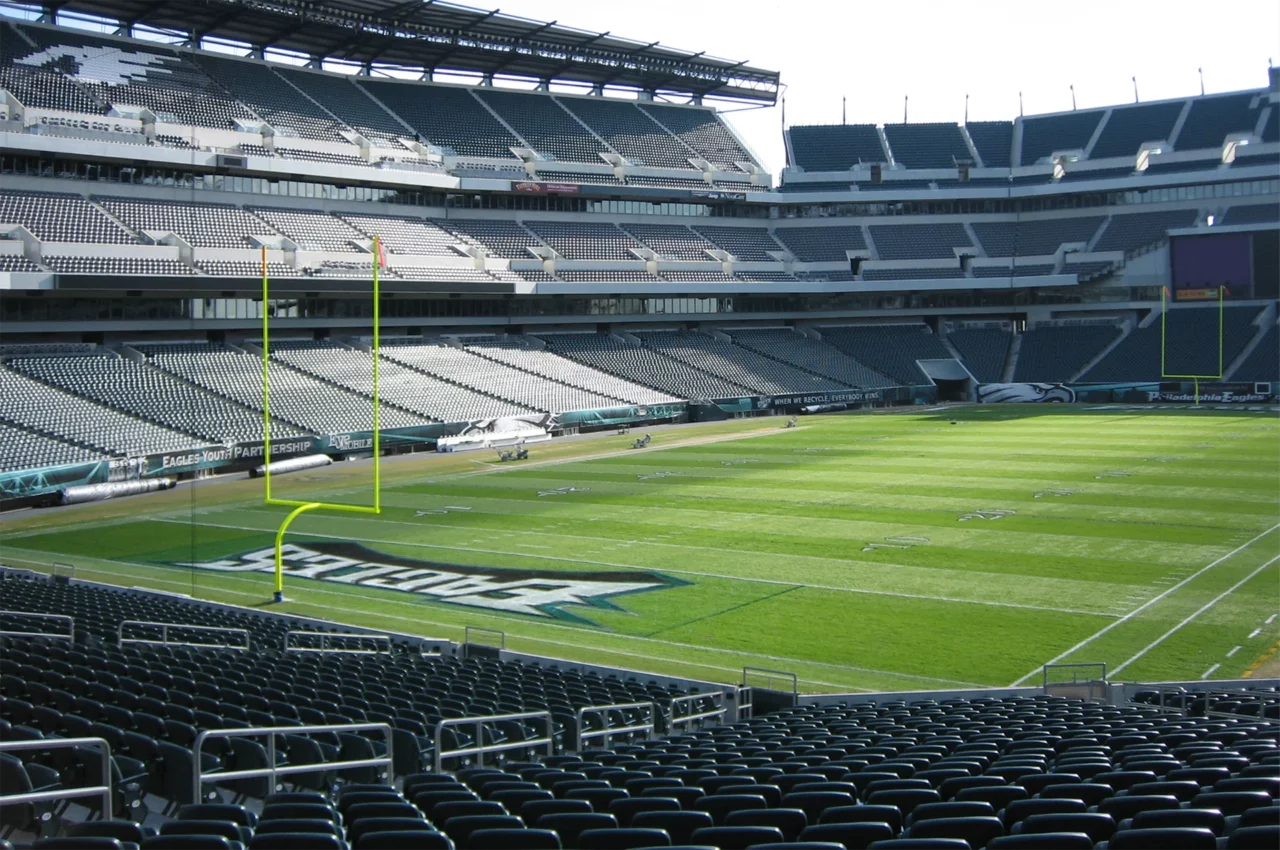Let’s (Re)Make A Deal!: Birds Back In Restructure Biz
As expected, the Eagles are getting down to dirty work in trying to become compliant with the NFL’s salary cap before the March 17 start of the new league year.
Howie Roseman, the team’s executive vice president of football operations, and his staff restructured the contracts of several veterans in the past 48 hours, a cap-manipulation technique that clears space in a current season by pushing money on the books to later seasons.
Among those who had deals redone was veteran center Jason Kelce, a three-time All Pro who turned 33 last November. Kelce, who recently became a father, announced his return on Instagram.

Eagles center Jason Kelce redid his deal to come back in 2021 for an 11th season.
Right tackle Lane Johnson and cornerback Darius Slay each reportedly had their deals restructured, and defensive end Brandon Graham is doing the same.
The moves are aimed at shaving off the roughly 43 million needed for the Eagles to be compliant with the projected team cap, which will be no less than $180 million but probably won’t be much higher. They’ll need to trim even more to sign any free agents and rookies.
It’s certain the NFL’s 2021 cap will be several million less than the 2020 number of $198.2 million, a drop caused by lost revenue from the pandemic.
Veteran wide receiver DeSean Jackson has already been released, soon to be followed by veteran receiver Alshon Jeffery. The cuts will save the Eagles some money, but both will still be on the books for dead money in 2021.
Tight end Zach Ertz, a three-time Pro Bowler and receiver of the go-ahead touchdown in the Eagles’ 2017 Super Bowl win over the Patriots, will likely be released if the Eagles can’t trade him.
Restructuring contracts in the past has helped the Eagles keep their core intact amid rising player costs to stay competitive – they were in the postseason three straight years from 2017-2019 – but revised deals also inflate future cap numbers, which the team OK’d because the overall cap went up every year – sometimes by tens of millions – and because the team typically restructured deals of younger players who were in, or entering, their primes.
But this recent spate of restructures involves several 30-somethings whose best seasons are in the rear-view window and leaves little wiggle room for comfortable escape in the event these veterans lose their grapple with Father Time.
The team hopes that a return to normalcy as the pandemic recedes, coupled with a few lavish, new TV contracts, will lead to another major spike in the cap. A big cap boost would ease the sting of moving from one or more of these veterans if they underperform.
Still, the amount of money being kicked down the road, in some cases for several years, puts the Eagles in a bind if one or more of these veterans confronts sudden, steep decline or major injury. This already happened with Jeffery and Jackson, who’ll account for more than $16 million against the Eagles’ cap despite playing elsewhere.
Having cap space occupied by players who aren’t on the roster, or aren’t meeting expectations, is partly the reason for the team’s current cap crisis.
The team is shrugging off these 2021 dead cap charges as a one-year blip caused by an unforeseen global crisis and unexpected divorce from their $125-million franchise quarterback. It’s a semi-rebuild, even though they’ll never use the “r” word.
Instead of a total roster whitewash, Roseman has decided to use old contract tricks to preserve his team’s viability while trying to flip the roster through the draft. But some of the extensions are a major dice roll.
Kelce’s restructure, per a source, is really a one-year deal for a minimum of $9 million with an upside of $12 million but has “dummy years” added to spread out the guaranteed money in future seasons and keep his 2021 cap number manageable, another contract tactic the Eagles have embraced over the years.
Per the source, the structure of Kelce’s revised contract ensures that Kelce would have to restructure the contract yet again in 2022 if he wanted to return to the team.
The Eagles saved more than $9 million in 2021 on the restructure of Slay’s deal, which was extended last year after the Eagles forked over a third and fifth to pry the Pro Bowl corner away from the Lions. Slay was already on the books in 2022 at nearly $23 million, a number that almost certainly will rise from the restructure.
Likewise, Graham and Johnson were already on the books for sizable figures in 2022 and beyond, cap numbers that are sure to rise after their latest restructures.
Now, the Eagles have to pray that borrowing against tomorrow for several veterans doesn’t backfire the way it did with Jeffery.
The Eagles would’ve preferred to move on from Jeffery after 2019, but his exorbitant cap number (nearly $15 million) combined with the surgically repaired foot that wouldn’t have him ready for the start of 2020, conspired against them.
Jeffery caught just six passes for 115 yards in seven games while taking up about 7 percent of the team’s cap space, one of the many lowlights of a 4-11-1 season.
After another recent restructure, Jeffery will count against the team’s books for at least one, and possibly two, more years despite the team’s plans to part ways with him before March 17.
Roseman is banking on a resurgent, vibrant cap in 2022, but even an expanded cap won’t safeguard them against rapid player decline.
This latest wave of restructures puts the organization in a real bind if players like Slay, Graham and Johnson – and any other veteran whose contract is restructured – regress precipitously, suffer a major injury or both.
Slay, who recently turned 30, was the team’s best corner in 2020 but had some memorable struggles against Chase Claypool, DK Metcalf and Davante Adams. He didn’t make the Pro Bowl for the first time in four years and exited several games with various bumps and bruises, missing one start from a concussion.
The Eagles backloaded his contract last offseason when they inked him to an extension that kept his 2020 and 2021 cap numbers under $7 million – a real steal for a good corner – but balloon to $21 million in 2022, and that’s before this latest restructure.
The team felt forced to play Jeffery last season because of the money owed him. What would happen in 2022 if Slay, Johnson, Graham – or anyone else who might be restructured this offseason – don’t meet expectations in 2021?
These are hypotheticals that will probably lead to some long, sleepless nights for Roseman, owner Jeffrey Lurie and everyone else tasked with this sudden, complex turnaround.
– Geoff Mosher (@geoffmoshernfl) is co-host of the “Inside the Birds” podcast and staff writer for InsideTheBirds.com.
Listen to the latest “Inside The Birds” podcast from Geoff Mosher and Adam Caplan here:
Or watch on YouTube:







Comments are closed here.